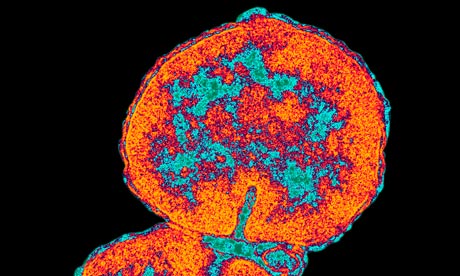
Sexually transmitted infections are soaring among young people failing to use condoms with new partners, the Heath Protection Agency warns on Thursday. There is particular concern about the numbers of very young people contracting gonorrhoea. Over half of all new infections – 57% – are in the under-25s, said the HPA in its annual report for England. Gonorrhoea cases among girls increased sharply from the age of 15 to peak at the age of 18, said Dr Gwenda Hughes, head of STI surveillance. "We have got high rates of infection in this population. In the older group it is much lower – particularly in women," she said.
There is also major concern about men who have sex with men – who may be gay or bisexual. The largest upsurge in new diagnoses in 2011 were among this group. Gonorrhoea cases increased by 61%, chlamydia by 48% and syphilis by 28%. Sexual health charities suggested the government's policy of cutting funding for sexual health awareness campaigns could be a factor while the Department of Health said more people were coming forward to be tested.
"The data in young, heterosexual people and MSM is very concerning," said Hughes. "Too many people are practising unsafe sex. They are getting STIs and putting themselves at risk of longer-term problems, such as [in women] ectopic pregnancies and tubal infertility. We think it is crucial that work to reduce STIs continues with a focus on at-risk groups."
In 2011, the number of newly diagnosed STIs rose by 2%, totalling nearly 427,000 new cases and reversing the small decline seen in previous years.
While the government believes that more and better testing is a factor in the overall rise, HPA experts said they were worried to see a downturn in the number of people coming for a chlamydia test. Dr Angie Bone, director of the HPA's national chlamydia screening programme, said the numbers of diagnoses had dropped from 154,000 in 2010 to 148,000 last year, which did not mean less chlamydia in the community but less testing. "This is something we are very keen to reverse," she said. Chlamydia is a very common infection that often has no symptoms, but left untreated it can cause infertility.
Sexually active young people and MSM are recommended to have a chlamydia test every year and whenever they change partners. MSM should also have an HIV test with the same frequency. "The more partners you have, the greater the risk of getting an STI," said Hughes. "People should consider reducing the number of partners they have and reduce overlap in their sexual partnerships."
Gonorrhoea is becoming a bigger worry because the drugs used to treat it are losing their effect. "This is a global problem, not just a UK problem," said Hughes. "This bug has successfully managed to develop resistance to every treatment that has been used for it for a decade. We are running out of options for managing this infection. We are concerned in the future it will become very difficult to treat."
There were 20,065 cases of gonorrhoea last year, which is a 25% rise on the 16,835 in the previous year and the biggest rise in any STI. Syphilis cases were up 10% from 2,650 to 2,915. Chlamydia was down 2% from 189,314 to 186,196 cases. Genital herpes and warts were also up by 5% and 1% respectively.
There is concern that advertising campaigns and efforts to increase people's awareness of the risks of STIs have decreased. The last chlamydia awareness campaign, called Sex worth talking about, was in 2010. When the coalition government came to power, it temporarily froze all spending on social marketing, although funding for campaigns such as the anti-obesity drive Change4Life has resumed. The onus under the health reforms will now be on local authorities, who will be expected to champion the public health initiatives needed in their own area.
Sexual health charities FPA and Brook said in a joint statement that the rise in STIs is a worrying trend. "It demonstrates exactly why safer sex messages and campaigns that young people and gay men will listen to and take action on, are absolutely necessary. Testing and treatment services are vital, but alone they are not enough to change people's behaviour.
"The impact of the government's disinvestment in campaigning around safer sex and sexual health reflects in today's statistics. Yet again we see more data illustrating why there is an urgent need for statutory sex and relationships education in schools alongside sustained investment in sexual health services."
A Department of Health spokesperson said: "The fact that more people are coming forward to be tested and the improvements there have been in the way tests are done is to be welcomed. But it's also clear that not enough people are taking care of their sexual health.
"Sexually transmitted infections can lead to infertility and other serious health problems. The message is clear: whatever your age, you should always use a condom.
We are changing the way we deal with public health issues by giving local councils ring-fenced budgets so they can raise awareness of and improve sexual health in their communities."

